Singer 12 Circa 1899
When I was lucky enough to come across this Singer 12 Family fiddle base hand crank sewing machine with its Ottoman Carnation Decals, I just had to get it. I suspect that a machine of this style and vintage does not come along every day of the week. I must admit until that day I don’t think I had seen one in real life. I was always hoping to find a fiddle base machine.
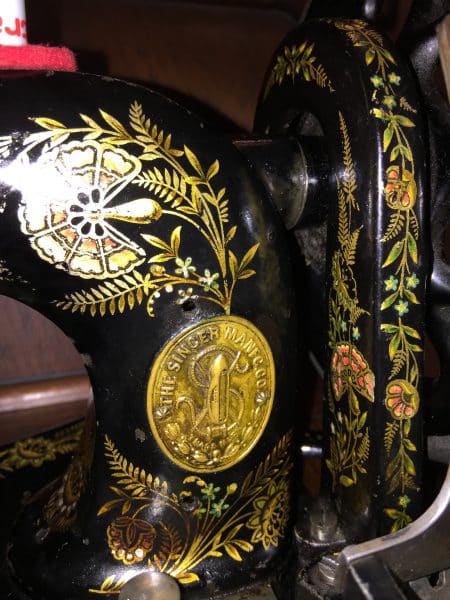
This certainly is a gorgeous piece of engineering. This is a transverse shuttle machine. The machine is so stylish and elegant. It’s a feast for the eyes and then at the same time, it is so refined in its size and shape. It does conjure up images of beautiful ladies in flowing dresses, working on beautiful pieces of stitchery and providing all means of practical textiles for the home and clothing for the family. It first became available in the 1860s. The machine came in a beautiful bent wood case which still has its decal on the front too. The case has a strong brass closure.
The machine had been beautifully cleaned up already so I did not have the challenge of sorting that out. Having said that, I have waited for some time to actually sew on it. Luckily for me there are two bobbins and needles.
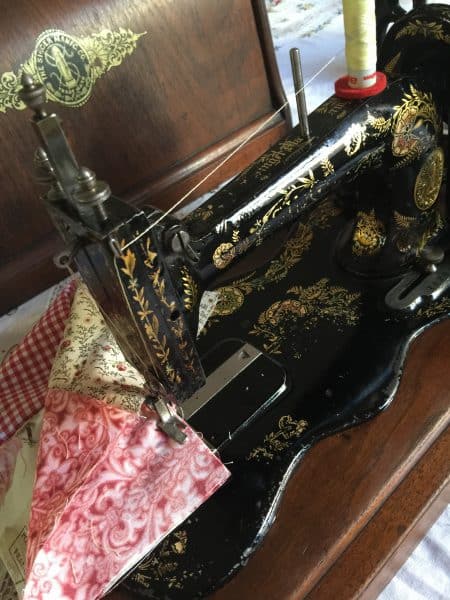
My first attempts to sew on this beauty were, to say the least, extremely disappointing. The stitching was very loose and at the same time pulling. Occasionally the needle was hitting down on the presser foot which was quite cringe worthy. Or the stitches were not catching successfully and would all come undone. I have probably spent five hours now adjusting the upper tension, working out how to successfully thread the shuttle bobbin to derive the correct tension and trying to work out how to correctly fill the bobbin.
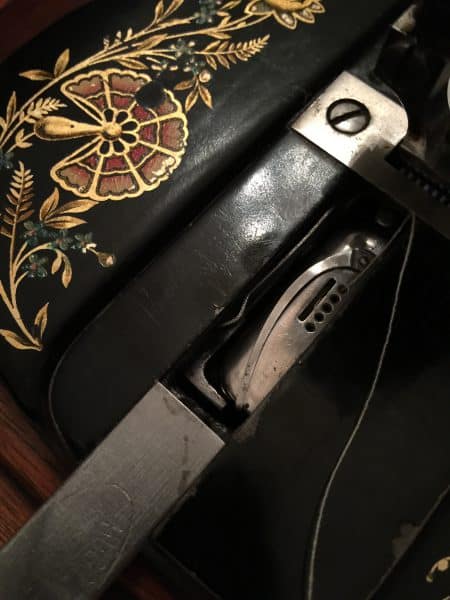
Luckily if you check on-line there is a free manual of Instructions for Using Singer 12K “Family” Sewing Machine. This is enormously helpful.
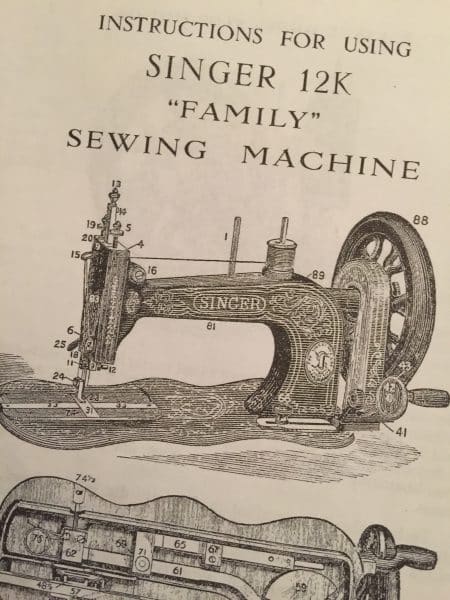
I must say that getting all the parameters exactly right for sewing is somewhat of an art. It’s not good enough to just wind cotton onto the shuttle bobbin. It turns out that the thread must be wound with greater density at each end of the spool and not too much in the centre. This is because the bobbin tension is created across the inside of the middle of the shuttle. If the bobbin is too full at the centre the thread will be broken. All of these three parts have to be “just right” in order for the machine to stitch. The top threading is very easy and intuitive. The top tension is adjusted by turning the tension screw at the top of the needle bar.
NEEDLES
Speaking of needles. This is a very nice post which discusses the needles for these machines. Also discussed is possible replacement needles, https://sewingtales.wordpress.com/2014/07/06/needles-and-my-singer-12/
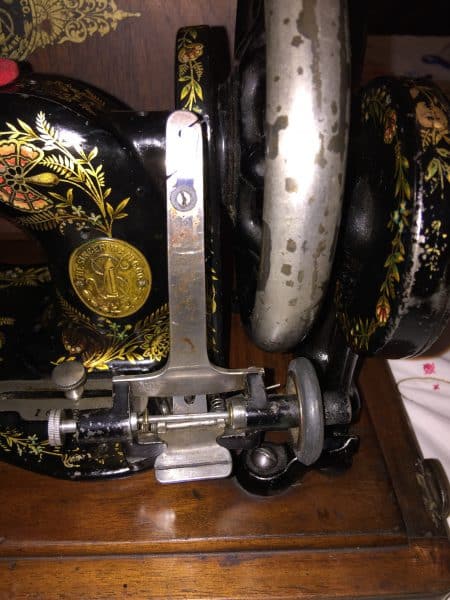
Now after spending the time I’m happy to say it does stitch. The stitches are a little tight, but after a fresh oiling of the machine, it’s now acceptable to sew a seam with. If you should happen across one of these machines in your travels, my recommendation would be, don’t pass it by. This is a beautiful piece of engineering which should be preserved for reasons of history, beauty and functionality which will never be reproduced .
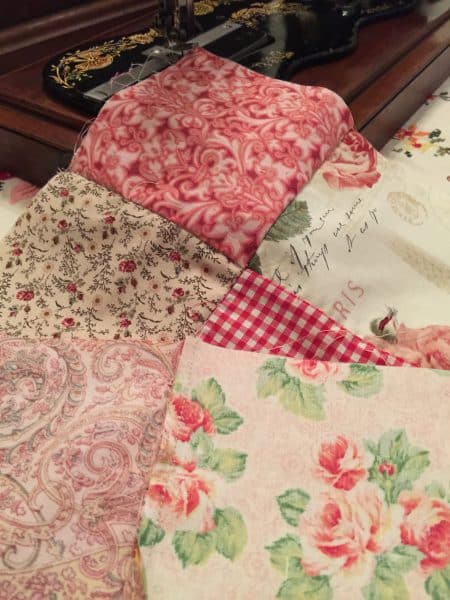
Now I have spent the time to adjust the settings for sewing, I can make something with this gorgeous little hand crank. I think it’s well worth the effort, and just a fraction of the cost of many modern machines.
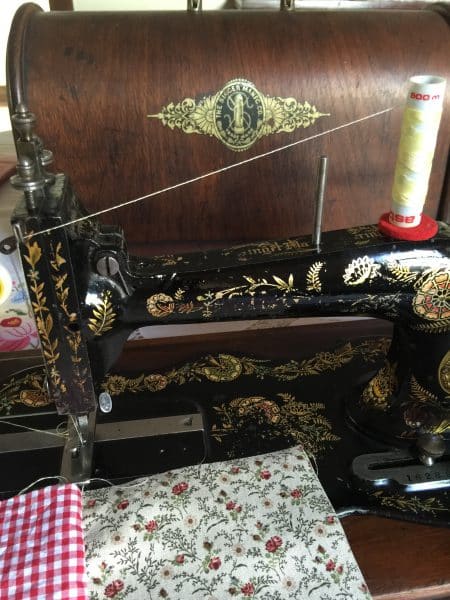
If you like the look of these four patches I am cranking, you might just be interested in this quilt.
Country Roses Four Patch Quilt Pattern
or this one..
Floral Fantasy Friendship Four Patch Quilt Pattern
If you enjoyed this post, you may also like this machine story,
All the best,
Susie

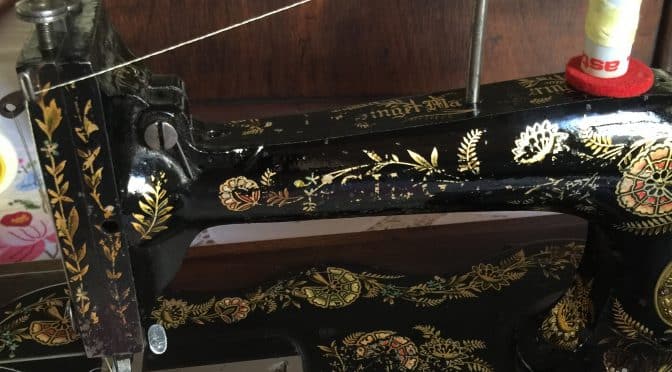
My husband surprised me with one of these for Christmas. It is not a fiddle base, or quite as ornate as yours, but beautiful nonetheless. Mine came with one bobbin and needle. My question to you is “Have you gotten any more bobbins, and what kind of needles are you using?” I would really like to use this machine (he thought it would be a decoration), especially when the power goes out. Any suggestions would be most appreciated!
Dear Renee, how beautiful! That was so thoughtful of him! I’m sure you will be able to use it. More detail is required. Do you have a brand name or serialnumber?
How wonderful to find such a beauty. Seeing the diagram explained to me ( I didn’t know ) why it is called a fiddle base. A delightful piece of fine engineering. Well done yoi